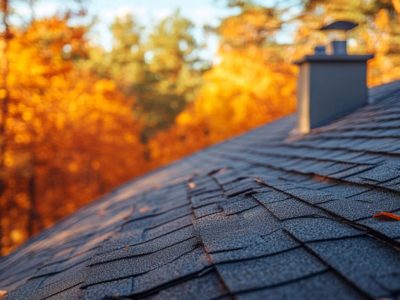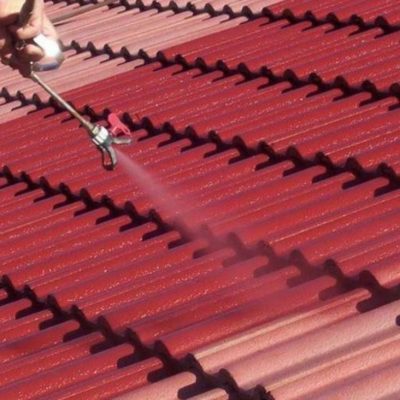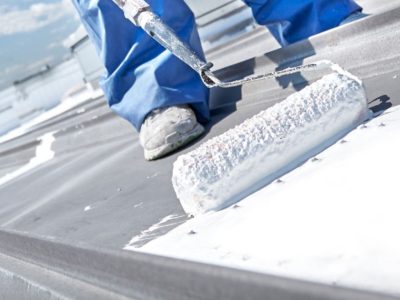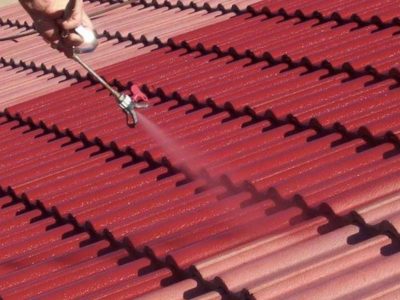Roof coating is a critical component in the maintenance and enhancement of a roofing system’s longevity. It serves as a protective layer, safeguarding the roof from environmental elements while simultaneously improving energy efficiency and reducing maintenance costs. Roof coatings can also help with roof renewal, saving building owners from expensive roof replacements. With a variety of roof coating types available, each providing distinct benefits, including acrylic coatings and silicone coatings, having a comprehensive understanding of these options can facilitate informed decision-making. This article examines the concept of roof coating, its significance, the various types available, associated costs, including labor costs and material costs, and guidelines for selecting the appropriate professional contractor to meet your needs. Explore how roof coating can significantly improve your property. Roof coatings not only enhance the roof’s lifespan but also contribute to energy savings and long-term savings.

What Is Roof Coating?
Roof coating refers to the application of a protective layer on roofing systems, primarily aimed at enhancing durability and extending the lifespan of the roof. This specialized roofing material is essential for building owners who are seeking cost-effective alternatives to traditional roof replacement. Roof coatings can include fluid-applied membrane techniques to ensure a seamless application.
By utilizing fluid-applied membranes, roof coatings not only improve energy efficiency but also offer excellent waterproofing capabilities. Restoration roofing techniques that employ these coatings have demonstrated significant benefits for both commercial properties and residential roofs, providing protection against weather damage, UV rays, and other environmental factors. Furthermore, they can address repair needs such as roof leak repair and seam reinforcement.

Why Is Roof Coating Important?
Roof coatings are critical for preserving the integrity and extending the lifespan of roofing systems, providing numerous benefits to building owners. These coatings function as a protective barrier against UV damage and various weather elements, ultimately reducing maintenance costs and prolonging the life of the roof. Regular roof inspection and cleaning preparation are crucial to ensure the coatings perform effectively.
Additionally, the application of roof coatings can improve energy savings through enhanced heat reflection, thereby contributing to greater energy efficiency and return on investment. With diligent roof inspections and compliance with warranty requirements, roof coatings can represent a cost-effective alternative to conventional roofing solutions, providing long-term savings and enhanced roof integrity.
Find out more: What Causes Of Roof Leakage

What Are The Different Types Of Roof Coating?
There are various types of roof coatings available in the roofing industry, each specifically designed to address unique requirements and accommodate different roofing systems. Among the most prevalent options are:
- Acrylic coatings, recognized for their UV resistance and heat-reflective properties,
- Silicone coatings, which excel in waterproofing and are particularly suitable for regions experiencing heavy rainfall,
- Polyurethane roof coatings provide superior protection against weather-related damage,
- Asphalt emulsion roof coatings present a practical solution for roofs requiring restoration.
Membrane roofing systems also benefit significantly from these diverse coatings, enhancing their overall performance and longevity.
Each type of coating is essential for enhancing the overall performance and longevity of the roof.
Acrylic Roof Coating
Acrylic roof coatings are widely recognized for their exceptional UV resistance and heat reflection properties, which contribute significantly to energy efficiency and overall roof condition.
These coatings not only enhance the durability of roofing systems but also considerably extend their lifespan. When applied correctly, they form a seamless membrane that effectively protects against water infiltration and other weather elements, a critical factor in maintaining the structural integrity of the roof.
The application methods for these coatings are relatively straightforward, usually involving spray, brush, or roller techniques that facilitate easy coverage of both smooth and uneven surfaces. Additionally, their cost-effectiveness is notable, as the initial investment is often recovered over time through energy savings and reduced maintenance expenses.
Acrylic roof coatings reflect a significant amount of solar energy, thereby reducing cooling costs during warmer months. By shielding the underlying materials from harmful UV rays, they help preserve the roof’s aesthetic appearance and functionality. Additionally, their corrosion resistance helps maintain the roof’s condition over time.
The long-term performance and low maintenance requirements of acrylic roof coatings make them a prudent choice for both homeowners and businesses. Cleaning preparation and regular roof inspection can further extend the benefits of these coatings.

Silicone Roof Coating
Silicone roof coatings are widely recognized for their outstanding waterproofing capabilities, providing effective protection for roofs against severe weather conditions. These coatings are also advantageous for membrane roofs and metal roofs due to their flexibility and adhesion properties.
These innovative coatings create a seamless, flexible barrier that not only prevents leaks but also demonstrates resilience against ponding water, a common challenge faced by many roofing systems.
One of the notable advantages of silicone roof coatings is their ease of application; they can be applied directly to most existing roofs without the need for extensive preparation, thereby saving both time and labor costs.
Additionally, silicone roof coatings exhibit remarkable resistance to corrosion, ensuring they maintain their integrity against rust and chemical degradation over time. This durability offers property owners the reassurance that their roofs are protected for the long term, contributing to improved roof integrity and reduced repair needs.
Moreover, these coatings are highly adaptable, making them suitable for various roofing systems, including metal, single-ply, and built-up roofs, thereby addressing a wide range of application requirements. Their versatility makes them ideal for both residential roofs and commercial properties.

Polyurethane Roof Coating
Polyurethane roof coatings offer substantial protection against weather-related damage, thereby preserving the integrity of roofing materials over time. These coatings also help with insulation repair, ensuring the building remains energy-efficient.
These coatings are well-regarded for their remarkable durability, often surpassing traditional roofing materials due to their exceptional resistance to cracking, peeling, and moisture infiltration. When applied correctly, polyurethane coatings form a seamless membrane that adheres effectively to various substrates, providing a dependable solution for insulation repair.
Key advantages include:
- The ability to expand and contract with temperature fluctuations helps maintain the roof’s integrity in challenging environmental conditions.
- This inherent flexibility aids in preventing common issues such as leaks, thermal shock, and other roofing solutions.
- Polyurethane roof coatings are available in a variety of colors, offering aesthetic flexibility while enhancing sunlight reflectivity, ultimately leading to reduced energy costs.
By employing this advanced material, property owners can ensure their roofs remain protected and energy-efficient for years to come.

Asphalt Emulsion Roof Coating
Asphalt emulsion roof coatings represent a cost-effective alternative for various roofing systems, offering a dependable solution for maintenance and restoration requirements. These coatings are particularly advantageous for restoration roofing projects.
These coatings not only enhance the longevity of roofs but also significantly reduce maintenance expenses over time. Designed to accommodate a wide range of roofing applications, they are suitable for built-up, modified bitumen, and single-ply systems. Homeowners and property managers frequently value their ease of application, which can facilitate quicker project completion and minimize disruption.
Asphalt emulsion coatings function as a protective barrier against environmental damage, effectively shielding roofs from the adverse effects of UV rays, water infiltration, and thermal expansion. This protective layer helps to minimize wear and tear, ultimately prolonging the life of the roofing system and ensuring that investments remain secure for years to come.

How Much Does Roof Coating Cost?
The cost of roof coating varies significantly due to several factors, including material expenses, labor costs, and geographical location. It is crucial for building owners to comprehend these variables to make informed decisions regarding their roofing projects and achieve a favorable return on investment.
Factors That Affect The Cost Of Roof Coating
Several factors influence the cost of roof coating, including the type of roofing system, roof accessibility, geographical location, and labor costs associated with the application.
The specific materials selected for the coating are instrumental in determining the overall investment. For example, traditional asphalt coatings may be perceived as more economical when compared to advanced liquid-applied membranes or high-performance elastomeric coatings, which typically offer enhanced durability and energy efficiency.
Moreover, geographical location significantly impacts not only material availability but also the unique climatic conditions that dictate the appropriateness of certain roofing systems.
- In warmer regions, reflective coatings are often preferred to decrease cooling costs, while colder areas may benefit from coatings that provide thermal insulation properties and enhanced waterproofing capabilities.
- Labor costs can fluctuate considerably based on local wages, the complexity of roof structures, roof accessibility, and the expertise of contractors.
For instance, a flat roof may necessitate specialized application techniques compared to pitched roofs, resulting in variations in labor expenses and project timelines. Additionally, membrane roofing systems might require different coating application methods. A comprehensive understanding of these factors is essential for planning a financially sound roofing project while ensuring long-term performance and reliability.
Average Cost Of Roof Coating
The average cost of roof coating can vary significantly based on the type of property, with commercial properties often incurring different expenses compared to residential roofs. This variability can pose challenges for property owners when budgeting for maintenance and improvements. Understanding these costs is essential for making informed decisions regarding roof management and ensuring that the selected coating meets both the aesthetic and functional requirements of the building. It’s crucial to consider the roof lifespan as part of the investment.
In a commercial setting, roof coatings typically range from $1.50 to $5.00 per square foot, with prices largely influenced by the quality of the materials used and the application method. Conversely, residential properties may experience costs between $0.75 and $3.00 per square foot.
These discrepancies can be attributed to several factors, including:
- Material Type: Different materials, such as acrylic, silicone, or polyurethane, entail varying cost implications due to their durability and longevity. Some newer options like spray foam roofs offer additional benefits.
- Roof Size and Complexity: Larger or more intricate roofs necessitate increased labor and materials, thereby elevating the overall cost.
- Geographic Location: Prices can fluctuate significantly based on location, influenced by labor costs and local market competition.
- Weather Conditions: Certain coatings may incur higher costs in regions with extreme climates, as they require specialized formulations to withstand harsh conditions.
Taking these factors into account enables property owners to accurately estimate expenses and select the most appropriate roof coating to enhance the longevity and performance of their roofs.
Additional Costs To Consider
Plus the initial application costs, building owners should take into account supplementary expenses such as maintenance costs and warranty requirements when budgeting for roof coating.
When planning a roof coating project, it is essential to anticipate potential additional costs that may arise after the initial application. One frequently overlooked aspect includes the need for roof cleaning and:
- Routine maintenance, which may encompass inspections and minor repairs
- Ongoing treatments to preserve the integrity of the coating
- Repairs that address unforeseen damage due to adverse weather conditions
Furthermore, building owners should consider exploring warranty options, as these can have a significant impact on overall expenses. Warranties generally cover defects in materials and workmanship; however, it is crucial to review the specific scenarios that are included or excluded to ensure comprehensive understanding and avoid unexpected costs in the future.

What Are The Benefits Of Roof Coating?
Roof coatings provide numerous benefits that significantly enhance the performance and longevity of roofing systems, representing a crucial investment for building owners. Among these advantages are the extension of the roof’s lifespan, improvement in energy efficiency, and reduction of maintenance costs over time.
Furthermore, roof coatings contribute to the preservation of roof integrity by offering protection against UV damage and severe weather conditions, thereby ensuring that the roof remains in optimal condition.
Extends The Lifespan Of Your Roof
One of the primary advantages of roof coating is its capacity to extend the lifespan of a roof, offering a viable restoration roofing solution that can postpone the need for costly replacements.
Plus significantly enhancing a roof’s durability, roof coatings serve as an essential barrier against various environmental stresses, including ultraviolet (UV) rays, precipitation, and temperature fluctuations. This protective layer effectively mitigates issues such as cracking, peeling, and other forms of deterioration that may develop over time. By reflecting sunlight, these coatings also reduce thermal expansion, thereby minimizing stress on the roofing materials. Notably, UV damage is a primary concern that these coatings address.
For example, a properly applied elastomeric coating can provide an extension of 10 to 20 years to the roof’s life. The waterproofing properties of these coatings help prevent leaks that could result in structural damage. Moreover, coatings contribute to improved energy efficiency by reducing heating and cooling costs.
Ultimately, these roofing solutions not only function as a protective shield but also represent an investment in the longevity and performance of the entire roofing system.
Improves Energy Efficiency
Roof coatings play a crucial role in enhancing energy efficiency by improving heat reflection properties, resulting in significant energy savings for building owners.
These coatings are specifically engineered to reflect a substantial portion of the sun’s rays, effectively minimizing the amount of heat absorbed by the roof surface. Consequently, buildings can maintain a cooler internal temperature, which reduces the reliance on air conditioning systems.
A study conducted by the Cool Roof Rating Council indicates that buildings with reflective roof coatings can achieve energy savings of up to 30% during peak cooling months. This reduction not only leads to lower utility bills but also extends the lifespan of roofing materials by decreasing thermal stress.
- Reflective coatings can lower roof surface temperatures by as much as 50°F compared to traditional materials.
- The implementation of cool roofs also contributes to the mitigation of urban heat island effects, providing additional benefits to local climates.
In summary, the adoption of these innovative solutions promotes a more sustainable environment while significantly improving overall energy efficiency.
Protects Against UV Rays
Roof coatings offer critical protection against harmful UV rays, which can degrade roofing materials over time and lead to premature failure.
These protective layers serve as a robust barrier, reflecting a substantial portion of solar radiation away from the roof’s surface. Typically composed of materials such as elastomeric, acrylic, or silicone, roof coatings enhance the durability and longevity of roofing systems.
Research indicates that roofs equipped with high-quality coatings can reflect up to 85% of UV rays, effectively reducing surface temperatures and enhancing energy efficiency. Consequently, property owners may experience a reduction in cooling costs of up to 30%. Furthermore, these coatings contribute to the overall resilience of roofing systems, minimizing the risk of cracks and blisters that can occur due to UV exposure.
For instance, a well-coated commercial roof can last up to 20 years longer than one lacking adequate protection. Notably, over 50% of roofing professionals recommend the application of roof coatings as a proactive measure against UV damage.
Reduces Maintenance Costs
By applying roof coatings, building owners can significantly reduce maintenance costs, resulting in long-term savings on roof upkeep and repairs.
These specialized coatings establish a protective barrier against adverse weather conditions, UV rays, and other damaging elements. Consequently, property managers observe that roofs remain in optimal condition, often extending their lifespan considerably beyond standard expectations. For example, a flat roof treated with a high-quality coating may require only minor repairs instead of a complete replacement, thereby reducing unnecessary capital expenditures.
Investing in roof coatings not only minimizes immediate repair needs but also yields substantial financial benefits over time.
- Studies indicate that regular maintenance associated with coated roofs can reduce lifecycle costs by up to 50%.
- Additionally, building owners may qualify for energy efficiency rebates, as these coatings reflect sunlight, thus lowering cooling costs.
Ultimately, the strategic decision to maintain roof integrity through coatings can prove to be a prudent financial choice for any property owner.

How Long Does Roof Coating Last?
The lifespan of roof coatings can vary significantly based on several factors, including the type of coating applied, prevailing environmental conditions, and the maintenance practices implemented. The warranty length often provides a good measure of expected durability.
Warranties typically provide an indication of the expected durability of these coatings.

Can You Apply Roof Coating Yourself?
Although some building owners may contemplate the option of applying roof coating independently, it is generally recommended to engage a professional contractor. This approach ensures proper application and compliance with warranty requirements.
How To Choose The Right Roof Coating Contractor?
Selecting the appropriate roof coating contractor is essential for ensuring successful application and achieving long-lasting results. Consequently, it is important for building owners to consider several key factors when choosing a professional contractor. Companies that specialize in restoration roofing and have experience with both residential and commercial property roofs can provide tailored solutions.









Comments